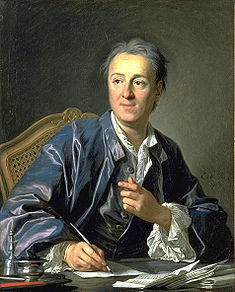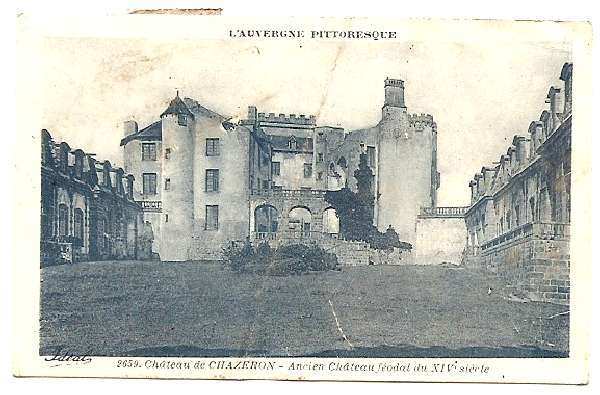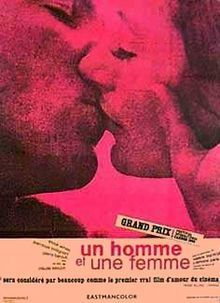ディドロの「私の古い部屋着への惜別」(1) Regrets sur Ma Vielle Robe de Chambre (1) [私の古い部屋着への惜別]
『百科全書』で有名なフランスの哲学者ディドロ Denis Diderot, 1713-84 は、同じく啓蒙思想家で理神論者だったアメリカのベンジャミン・フラクンリンなんかよりももしかするとずっと文学的なひとで、小説も書いた(ベンちゃんはアメリカ短篇小説の最初とも言われるポリーなんとかの弁明と『自伝』だけだ)。
あ゛・・・・・・じつはフランス語の勉強に燃えたのでした(マラルメはポーを読めるようになるべく英語を勉強したというが)。フランス語のウィキペディアは <http://fr.wikipedia.org/wiki/Denis_Diderot> です。

Diderot par Louis-Michel van Loo (1767)
"Regrets sur [de] ma Vielle Robe de Chambre ou Avis à Ceux Qui Ont Plus de Goût Que de Fortune" (「私の古い部屋着への惜別、または財産より趣味を多く持つ人へ与える意見」)は1772年に発表されたエッセイで、原文は Project Gutenberg で読めます―― <http://www.gutenberg.org/ebooks/13863>。日本語のウィキペディアによると「邦訳の『著作集』は法政大学出版局で3巻刊行された。(1976-89年)」のだそうだけれど、それに入っているかどうかいまは確認できません(勢いで書いているw)。
----------------------------------------------------------
私の古い部屋着への惜別、または財産より趣味を多く持つ人へ与える意見
ドニ・ディドロ
Pourquoi ne l'avoir pas gardée? Elle était faite à moi; j'étais fait à elle. Elle moulait tous les plis de mon corps sans le gêner; j'étais pittoresque et beau. L'autre, raide, empesée, me mannequine. Il n'y avait aucun besoin auquel sa complaisance ne se prêtât; car l'indigence est presque toujours officieuse. Un livre était-il couvert de poussière, un de ses pans s'offrait à l'essuyer. L'encre épaissie refusait-elle de couler de ma plume, elle présentait le flanc. On y voyait tracés en longues raies noires les fréquents services qu'elle m'avait rendus. Ces longues raies annonçaient le littérateur, l'écrivain, l'homme qui travaille. A présent, j'ai l'air d'un riche fainéant; on ne sait qui je suis.
どうしてあれをとっておかなかったのだろう? あれはわたしにフィットしていたし、わたしもあれにフィットしていた。あれはわたしの体に窮屈でなく、体のあらゆるラインにはまっていた。わたしはピトレスク〔pittoresque〕で美しかった。もうひとつのは、こわばっていて、ごわごわしていて、わたしをマネキンみたいにぎこちなくさせる。いかなる用事にもあの服はこころよくはからってくれた。というのも貧窮というのはつねに親切なものだから。本がほこりだらけになっていると、部屋着の襞がそれを拭いてくれた。ペンのインクが濃くなってきて出るのを拒んだときには部屋着がその裾を提供してくれたので、頑固なペンから出てきた長い黒いラインが跡になっているのが見えるだろう。長いすじは、その持ち主が著述家、作家、刻苦する人間だということを吹聴していた。いまのわたしは裕福なのらくら者で、誰もわたしが何者かわからない。
(つづく・・・・はやっw)
///////////////////////
フランス語のピトレスク pittoresque はイタリア語のピトレスコ pittoresco がもとで、フランス語を経由してピクチャレスク picturesque として英語に入るのが18世紀中葉のことです。"pittore" は picture (絵)じゃなくて painter (絵描き・画家)であって、ピクチャレスクは「絵のような」という意味ではなくて、もともとは「画家の painter's」 というような意味なのでした。「画家の目で見て絵になる」というような意味合い。
ディドロは美学関係の著作がけっこうあるのだけれど、ピクチャレスク趣味のひとだったのかしら。エッセイの最後からふたつめの段落にも出てきます。――
Si vous voyiez le bel ensemble de ce morceau; comme tout y est harmonieux; comme les effets s'y enchaînent; comme tout se fait valoir sans effort et sans apprêt; comme ces montagnes de la droite sont vaporeuses; comme ces rochers et les édifices surimposés sont beaux; comme cet arbre est pittoresque; comme cette terrasse est éclairée; comme la lumière s'y dégrade; comme ces figures sont disposées, vraies, agissantes, naturelles, vivantes; comme elles intéressent; la force dont elles sont peintes; la pureté dont elles sont dessinées; comme elles se détachent du fond; l'énorme étendue de cet espace; la vérité de ces eaux; ces nuées, ce ciel, cet horizon! Ici le fond est privé de lumière et le devant clair, au contraire du technique commun. Venez voir mon Vernet; mais ne me l'ôtez pas.
この絵のアンサンブルをあなたが見たならば、どれほどすべてが調和していることか、どれほど効果が連鎖していることか・・・・・・どれほどこの木はピトレスクなことか。

L'Auvergne pittoresque post cartel, 14x9 cm image: toupapier.com <http://www.toupapier.com/description.php?lang=1&path=1117&sort=Les plus populaires&page=60&id=2020>
廃墟趣味的な感性もイギリスと通じ合っていたのかしら。あ、廃墟じゃないか。Chateau de Chazeron? シャズロン城。
男と女 A Man and a Woman /Un homme et une femme [魂と霊 Soul and Spirit]
さっき「我が魂、プシュケーとともに With Psyche, My Soul [魂と霊 Soul and Spirit]」を書いていてふと思い出したので、自己剽窃的に、2年前の2月にカリフォルニア時間の「February 17 イヴの創造とアダムの肋骨と横隔膜(序) [思いつき]」に書いた文章と引いた絵を引用します。
BGM はこれかな。
--------------------ここから---------------------------
14世紀イタリアの Bartolo di Fredi が描いた、教会堂の壁画の一部を成しているフレスコ画は次のような不思議な絵です。――
.jpg)
The Creation of Eve, fresco by Bartolo di Fredi, Italy, 14th c.
これは字義どおりに聖書を解釈しているとかなんたらいうコメントを全然別の場所で読んだことがありますが、聖書の創世記第2章が述べているのは以下のような、天地創造後に一休みしたあとで、土の塵から人間(アダム)をつくって生命の息を吹き込んで生きる魂にし(7節)、彼をエデンの庭師にして、でも生命の木と対になる善悪の木の実だけは食っちゃだめだぞ、食ったら死んじゃうから、と言ったあとふいに、ひとりじゃさみしかろうて、とあれやこれやの生き物をつくり、それにアダムは名前をつけ、それでも助けが足りないとアダムがいうので、神はアダムを眠らせている(これが麻酔の最初だという説があります。催眠の最初かもw)あいだにアダムの肋骨を一個とって、そのあとの肉を埋め、とりだした肋骨を女とする(下の欽定訳聖書の英語の語順をかえると、 he made the rib a woman というSVOC のかたち)、いわゆる「アダムの肋骨」からの女性創造の話です。
だから、字義どおりというのではないと思う。だって脇腹からモロに生まれているから。
そして、あれこれ調べてみると、同種の絵はかなりの数あるのでした。
つぎの英文は1611年のAuthorized Version の聖書の創世記冒頭に近い第2章。
1: Thus the heavens and the earth were finished, and all the host of them.
2: And on the seventh day God ended his work which he had made; and he rested on the seventh day from all his work which he had made.
3: And God blessed the seventh day, and sanctified it: because that in it he had rested from all his work which God created and made.
4: These are the generations of the heavens and of the earth when they were created, in the day that the LORD God made the earth and the heavens,
5: And every plant of the field before it was in the earth, and every herb of the field before it grew: for the LORD God had not caused it to rain upon the earth, and there was not a man to till the ground.
6: But there went up a mist from the earth, and watered the whole face of the ground.
7: And the LORD God formed man of the dust of the ground, and breathed into his nostrils the breath of life; and man became a living soul.
8: And the LORD God planted a garden eastward in Eden; and there he put the man whom he had formed.
9: And out of the ground made the LORD God to grow every tree that is pleasant to the sight, and good for food; the tree of life also in the midst of the garden, and the tree of knowledge of good and evil.
10: And a river went out of Eden to water the garden; and from thence it was parted, and became into four heads.
11: The name of the first is Pison: that is it which compasseth the whole land of Havilah, where there is gold;
12: And the gold of that land is good: there is bdellium and the onyx stone.
13: And the name of the second river is Gihon: the same is it that compasseth the whole land of Ethiopia.
14: And the name of the third river is Hiddekel: that is it which goeth toward the east of Assyria. And the fourth river is Euphrates.
15: And the LORD God took the man, and put him into the garden of Eden to dress it and to keep it.
16: And the LORD God commanded the man, saying, Of every tree of the garden thou mayest freely eat:
17: But of the tree of the knowledge of good and evil, thou shalt not eat of it: for in the day that thou eatest thereof thou shalt surely die.
18: And the LORD God said, It is not good that the man should be alone; I will make him an help meet for him.
19: And out of the ground the LORD God formed every beast of the field, and every fowl of the air; and brought them unto Adam to see what he would call them: and whatsoever Adam called every living creature, that was the name thereof.
20: And Adam gave names to all cattle, and to the fowl of the air, and to every beast of the field; but for Adam there was not found an help meet for him.
21: And the LORD God caused a deep sleep to fall upon Adam and he slept: and he took one of his ribs, and closed up the flesh instead thereof;
22: And the rib, which the LORD God had taken from man, made he a woman, and brought her unto the man.
23: And Adam said, This is now bone of my bones, and flesh of my flesh: she shall be called Woman, because she was taken out of Man.
24: Therefore shall a man leave his father and his mother, and shall cleave unto his wife: and they shall be one flesh.
25: And they were both naked, the man and his wife, and were not ashamed.
ここで、思いつきです。肋骨ってフレノロジー (= science of mind) のフレノ=横隔膜と関係しているということはないのだろうか。
「横隔膜が動かなくなると、内臓も動かなくなる。 横隔膜は、肋骨の下側を全て覆う形に付いている筋肉で、深呼吸するための筋肉である。 横隔膜の上には、心臓と肺が、下側には、肝臓、胃、膵臓、脾臓、大腸などが隣接している。」(『キュアハウスな一日』「胸の苦しみ」2009.1.5 <http://blog.livedoor.jp/curehouse/tag/%B8%C6%B5%DB>)
とりわけ息 breath, breath of life と関係しているということはないのだろうか。
ということでこれからヒマを見つけてワキの甘い空論を唱えてみたいという気がしています。
ちなみに、The Androgyne: Reconciliation of Male and Female (New York: Crososroad, 1981) という両性具有のイメージを探究した本の著者のエレミール・ゾラは、もちろんこれをまずは両性具有の喪失のドラマと読むわけですが、男女のジェンダーにどのように「性差」が分与されるかについて、こんなふうに書いています。(参考のために長めにメモっておきます)――
Adam was plunged into a swoon (compare the myth of Narcissus, the Swooner, on p. 20), and the first fall took place with the loss of androgyny. In Christian symbolism the extraction of Eve from Adam's side is usually shown as the work of God the Son, of the Word which is the discerner of hearts, the principle of division itself, 'sharper than any two-edged sword, piercing even to the dividing asunder of soul and spirit, and of the joints and marrow' (Hebrews 4: 12). Eve was interpreted as the soul, the life of the senses, and a now diminished Adam as will and reason, the spirit. The only remanining link between them after the fall was imagination. They would imagine each other as their respective needs, so in order to tempt them to their second fall, Satan became a serpent, which St. Augustine interpreted as imagination incarnate. To redress all this, the Son or Word was said to have entered into the womb of a daughter of Eve (whom he had originally extracted from Adam's side), in order to be born of her as a New Adam, a 'First-Engendered', yet born of woman. The womanliness in man could now participate in the mystery of God's incarnation through identification with the model for womanhood, who was daughter of her son, mother of her father and virgin wife of both. All family ties, the strongest, or at least stable, emotional forces in man, were evoked and trebled, made bewildering by paradox and associated with these basic theological conceptions. This kind of 'divine' family romance was concocted by ecclesiastical institutions to secure strong emotional appeal. However, imagining onself living through it led to the inner restoration of the emotional and rational completeness of, and total participation in, lost androgyny. (Pp. 40-41)
アカの前のところでは、キリスト教のシンボリズムでは、子なる神、つまりイエスの業として、イヴのアダムのワキからの摘出が描かれてきたと書かれています。エホヴァじゃなくてイエスが創世記にあらわれてしまうのですか(Lord God=Lordで一体ということですか)。
赤字部には異論があったのですが(逆じゃないの、みたいなw)、しかしその後のヘビの知恵の問題とか考えるとなかなかむつかしいような、そして、どうころんでも性差別が生じるような。ということで、これは男女の霊性問題の序でした。(なんか思いつきの横隔膜のほうへは進展しないような気がします。)
--------------------ここまで---------------------------
みたいなことを書いたのです。
いっぽうでユング的なアニマ/アニムスみたいなことを思いつつ、イヴが Soul / Psyche ということで考えてみると、主体的自我はどこにあるんだ、という疑問が生じつつも(アダムが spirit だとしたら、それは何?)、マラルメやポーにつながるものがあるかもしらんとも思い、
( ..)φメモメモ的に
//////////////////////
以下はむかしの( ..)φメモメモ
「ミケランジェロが『アダムの創造』に描いたものとは」 X51.ORG <http://x51.org/x/04/01/1327.php> 〔脳解剖学的図像学 2004.1.13。当然ミケはイヴの創造も描いています〕
Genesis, from The holy Bible, King Jamesversion <http://etext.lib.virginia.edu/etcbin/toccer-new2?id=KjvGene.sgm&images=images/modeng&data=/texts/english/modeng/parsed&tag=public&part=2&division=div1> 〔Virginia 大学の英訳聖書 e-text〕
我が魂、プシュケーとともに With Psyche, My Soul [魂と霊 Soul and Spirit]
マラルメのエッセイ "Crayonné au Théatre" (Pages [1891] 所収版) の第5節 "Lassitude" の第7パラグラフ――
Autre chose paraît inexact et en effet que dire? Il en est de la mentale situation comme des méandres d'un drame et son inextricabilité veut qu'en l'absence là de ce dont il n'y a pas lieu de parler, ou la Vision même, quiconque s'aventure dans un théâtre contemporain et réel soit puni du châtiment de toutes les compromissions; si c'est un homme de goût, par son incapacité à n'applaudir. Je crois, du reste, pour peu qu'intéressé de rechercher des motifs à la placidité d'un tel personnage, ou Vous, Moi, que le tort initial a consisté à se rendre au spectacle avec son Ame—with Psyché, my soul: qu'est-ce! si tout s'augmente, selon le banal malentendu d'employer comme par nécessité sa pure faculté de jugement à l'évaluation de choses entrées déjà censément dans l'art ou de seconde main, bref à des oeuvres.
第2パラグラフ――
—Que souhaitaient-ils donc accomplir, ô mon âme? réplique-je une fois et toujours interloqué ou éludant la responsabilité d'avoir conduit ici une si exquise dame anormale: car ce n'est pas elle, sûr! s'il y faut voir une âme ou bien notre idée (à savoir la divinité présente à l'esprit de l'homme) qui despotiquement me proposa: «Viens».
研究書――
Crayonné au théatre begins with the author in despair―"Despair uppermost in my mind [désespoir en dernier lieu de mon i[I]dée]"―finding himself at the theater with "lost looks [regards perdue]" and "features already tired out by nothingness [traits à l'avance fatigués du néant]" (293). He has brought along a friend, a woman who thinks the performance is fine: "But it's good, it's perfect―what more do you hope for, my friend?] [Mais c'est très bien, c'est parfait—à quoi semblez-vous prétendre encore, mon ami?]" (293). What has brought him to the theater, and what makes him displeased with what he finds there? His response: "my habitual unconsidered lack of foresight [un habituel manque inconsidéré chez moi de prévoyance]" (293).
He has come to the theater hoping to find in the performance the elusive "idée," which he defines as a collective coming together, the production or presence of divinity in the "lieu divin" of the theater: "if we must see a soul there, or else our idea (that is divinity present to man's mind) [s'il y faut voir une âme ou bien notre idée (à savoir la divinité présente à l'esprit de l'homme)]" (293). He wants to see something that is not visible: a divine presence manifested in the audience but not represented onstage. While the horizon glows each evening, he notes, society goes to the theater, as if hungry, to be fed by the "social organization [l'arragement social]" (294) of stage and spectators. This "idea" Mallarmé is looking for is theater itself; the two are equated in his notes for the project of Le Livre: "from whence Theater = idea [d'où Théâtre = idée]" (429). Theater brings the "idea" to light, not by presenting it onstage but by causing it to be present in this "social organization"; the stages creates "pleasures enjoyed in common [plaisirs pris en commun]" (314) and is "the majestic opening out onto the mystery that we are in the world to contemplate [la majestueuse ouverture sur le mystere dont on est au monde pour envisager]" (314). The theater is not a place for watching a representation but fo renvisioning a mystery.
This making-present-without-representing is what the ideal theater could do but what the contemporary theater almost invariably fails to do for Mallarmé. There is nothing in it to feed the soul. "the initial mistake remained going to the show with one's Soul [le tort initial demeura se rendre au spectacle avec son Ame with Psyche my soul]" (294). This theater "only displays a representation, for those not having to see the things themselves at all [montre seulement une représentation à l'usage de ceux n'ayant point à voir les choses à même!]" (294). Representation is a shadow or screen obscuring "les choses à même," preventing the viewer from "seeing" things themselves. If Mallarmé goes to the theater it is because it offers "the charm perhaps unknown, in literature, of severely extinguishing, one by one, every view that would burst forth with purity [le charme peut-être inconnu en littérature d'éteindre strictement une à une toute vue qui éclaterait avec pureté]" (298). That is, the theater can both bring images to light and snuff them out, make them visible and then invisible. (Felicia M. McCarren, Dance Pathologies: Performance, Poetics, Medicine [Stanford: Stanford UP, 1998 (Writing Science Series)], 114-116)
"Crayonné au Théatre" はマラルメが1880年代と90年代に書いた劇評で、テクストの異同はよくわかりませんけど、 "avec son Ame with Psyche my soul" とマッカレンさんが引いている箇所は、引用が含まれていて、それはポーの詩 "Ulalume" です。第2連に出てくるフレーズです。――
ULALUME (1847)
Edgar Allan Poe
The skies they were ashen and sober;
The leaves they were crisped and sere―
The leaves they were withering and sere;
It was night in the lonesome October
Of my most immemorial year;
It was hard by the dim lake of Auber,
In the misty mid region of Weir―
It was down by the dank tarn of Auber,
In the ghoul-haunted woodland of Weir.
Here once, through an alley Titanic,
Of cypress, I roamed with my Soul―
Of cypress, with Psyche, my Soul.
These were days when my heart was volcanic
As the scoriac rivers that roll―
As the lavas that restlessly roll
Their sulphurous currents down Yaanek
In the ultimate climes of the pole―
That groan as they roll down Mount Yaanek
In the realms of the boreal pole.
〔3~9スタンザ省略〕
Ame (âme) はSoul = Psycheです。マッカレンさんが "mind" と訳している "esprit" というフランス語は英語の spirit なわけですけど、ポーにしてもマラルメにしてもどういうふうに考えておったのか。





.jpg)